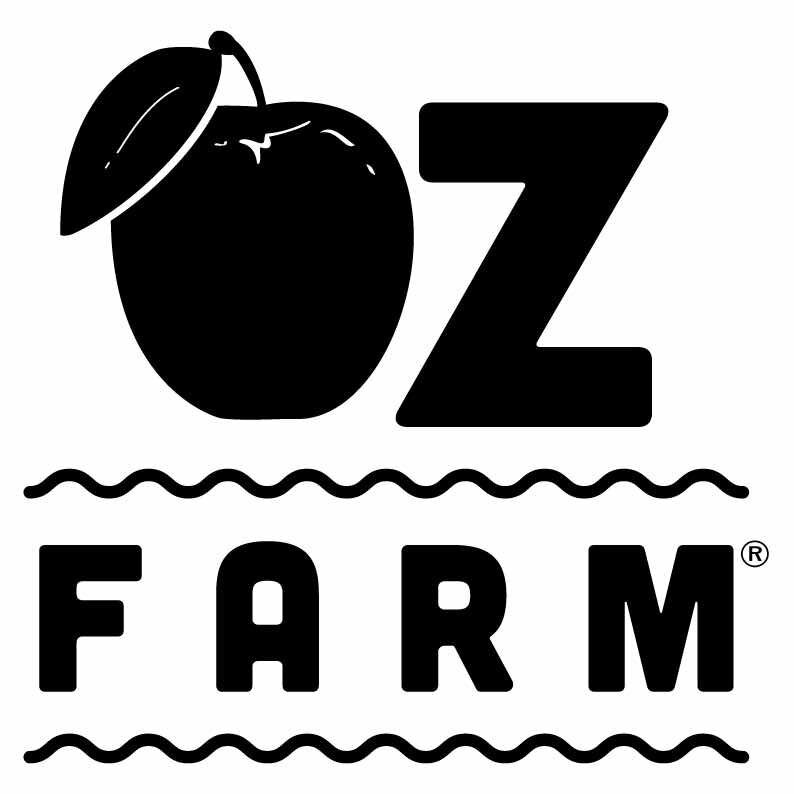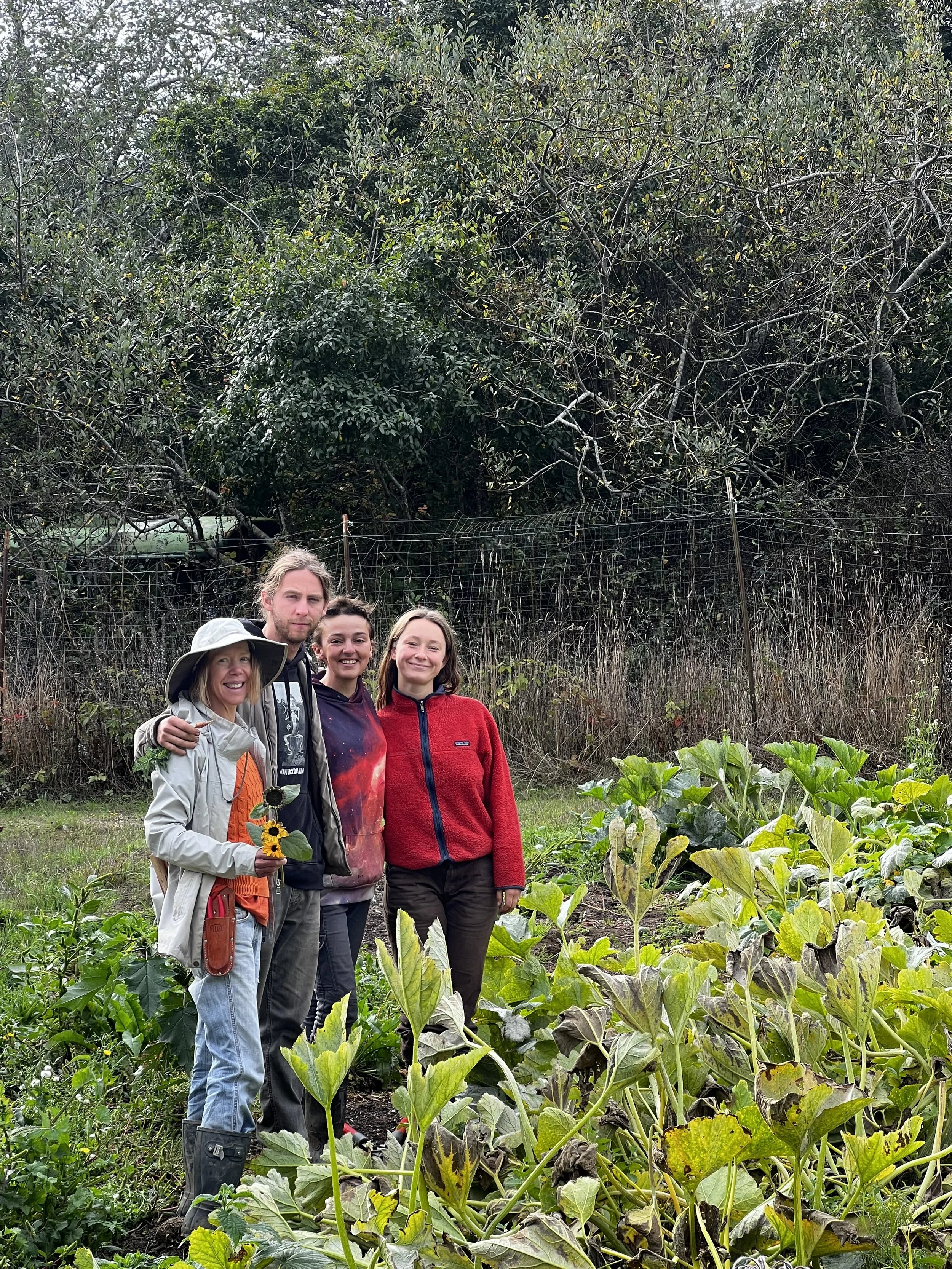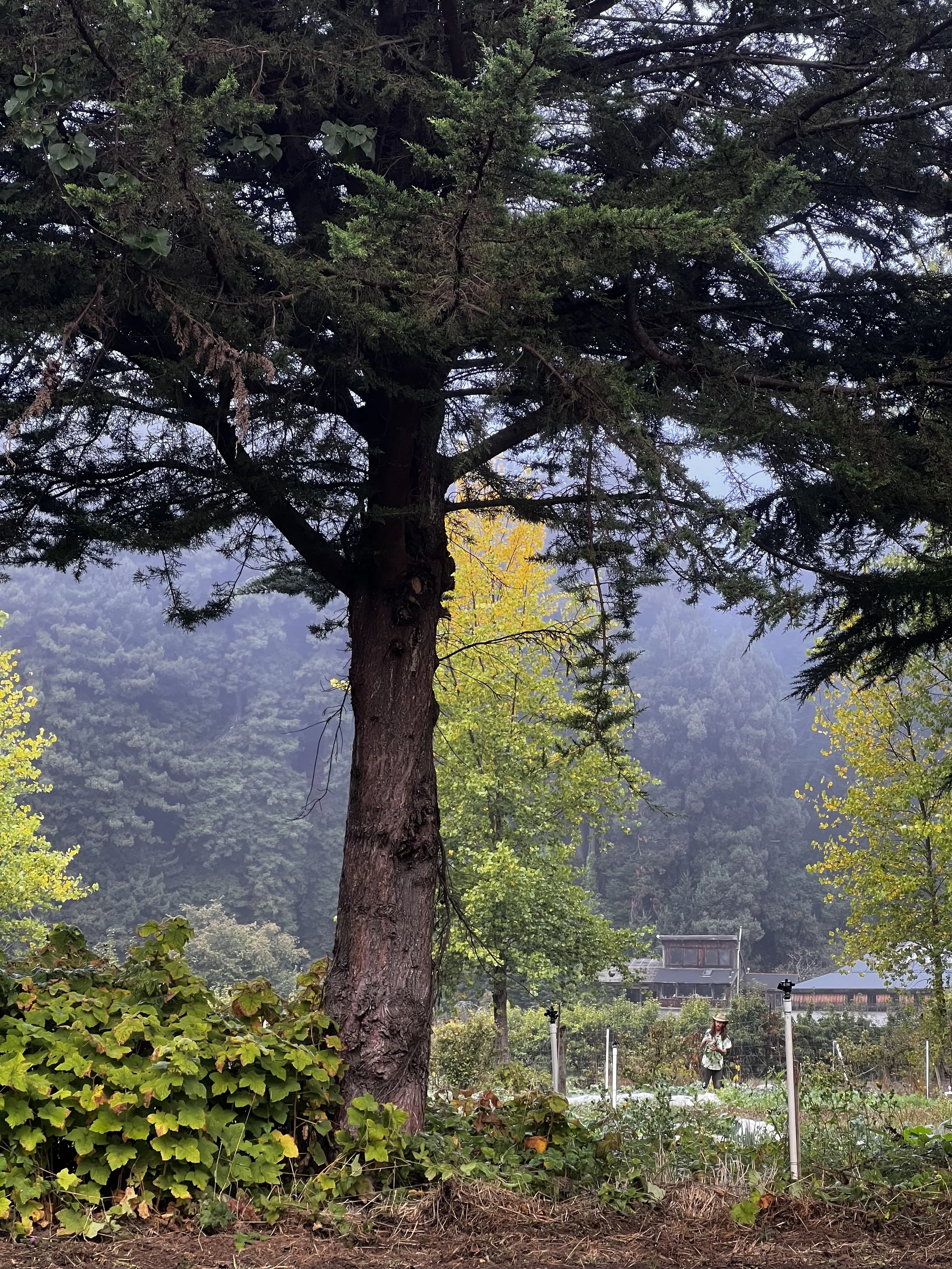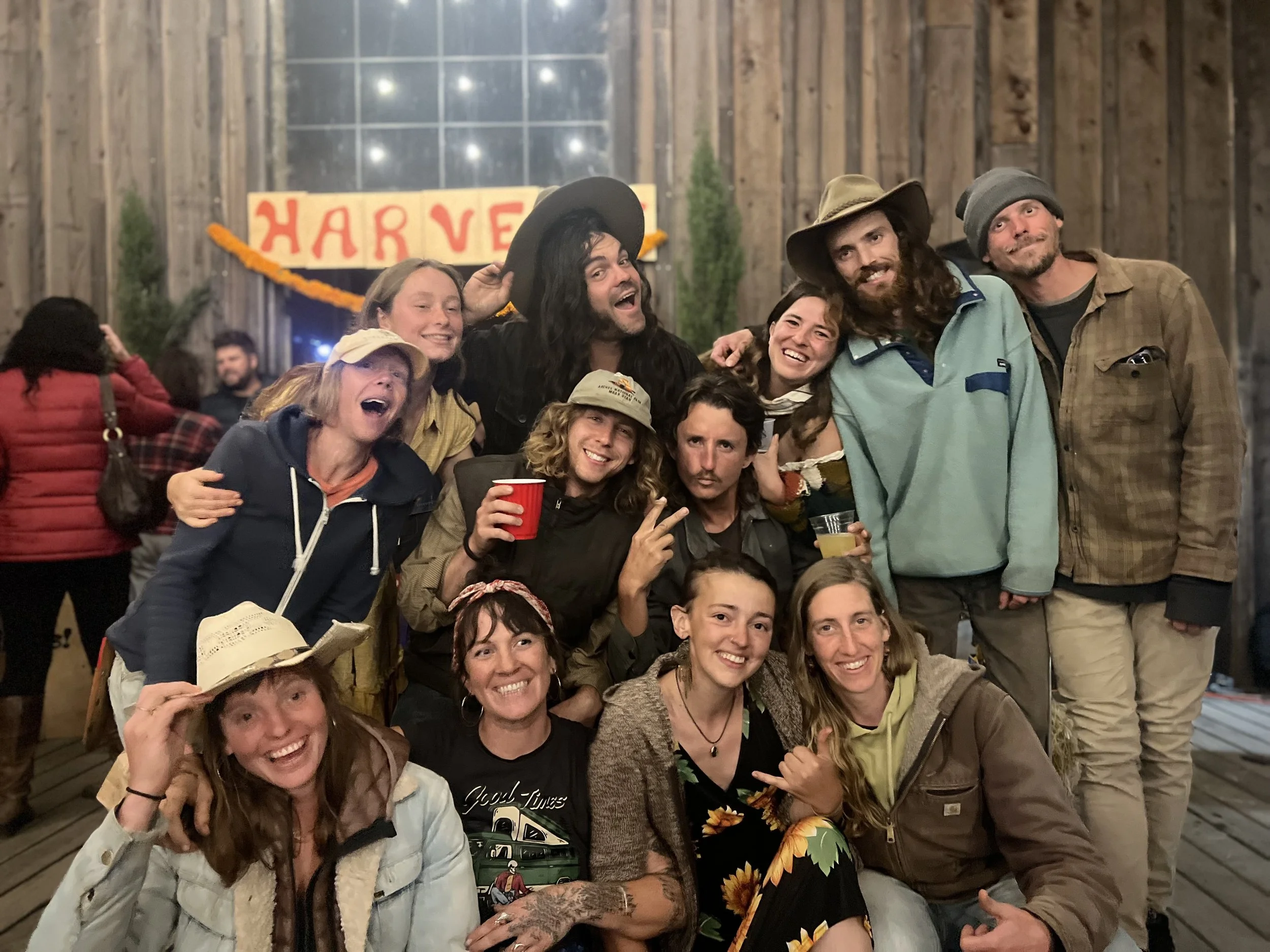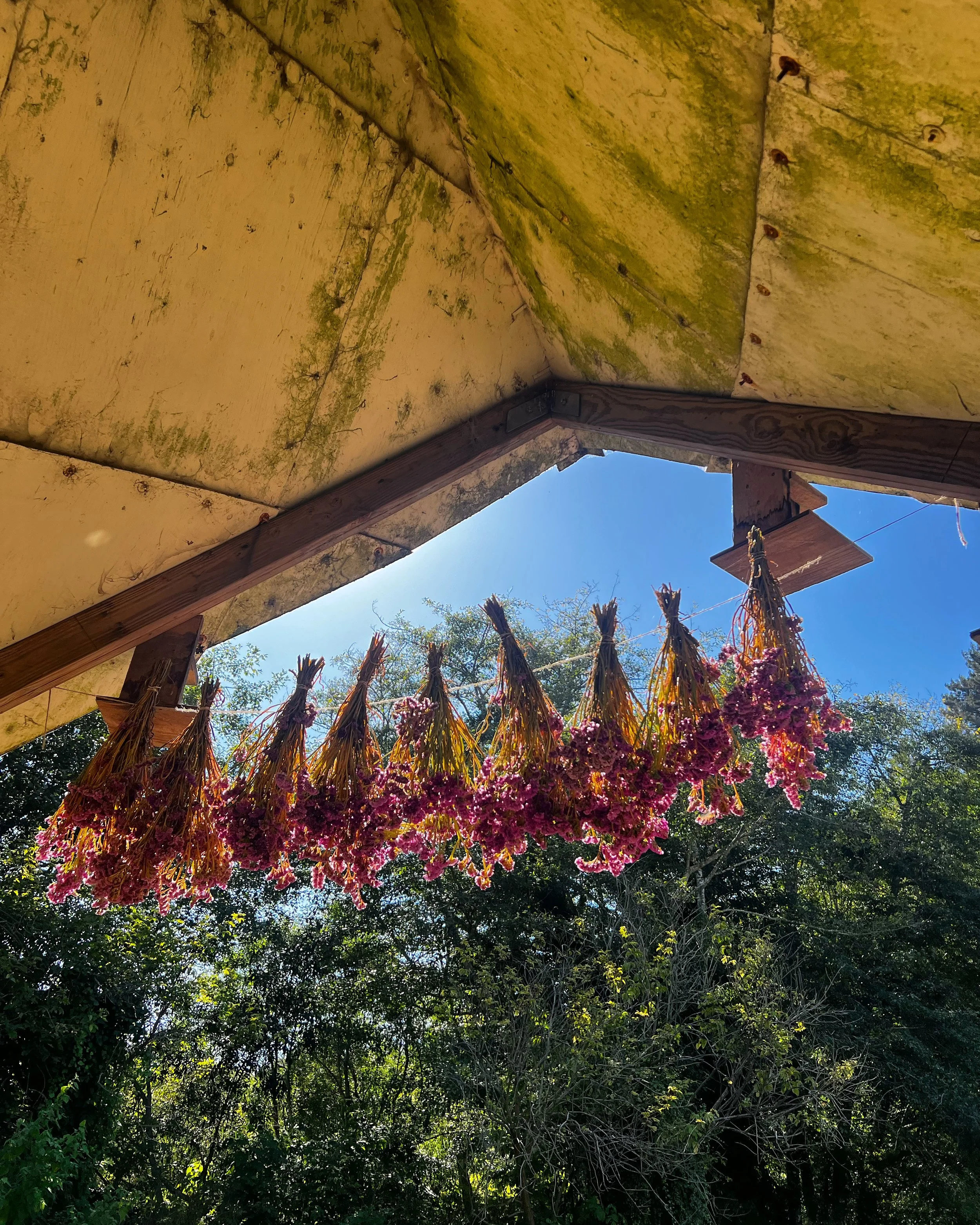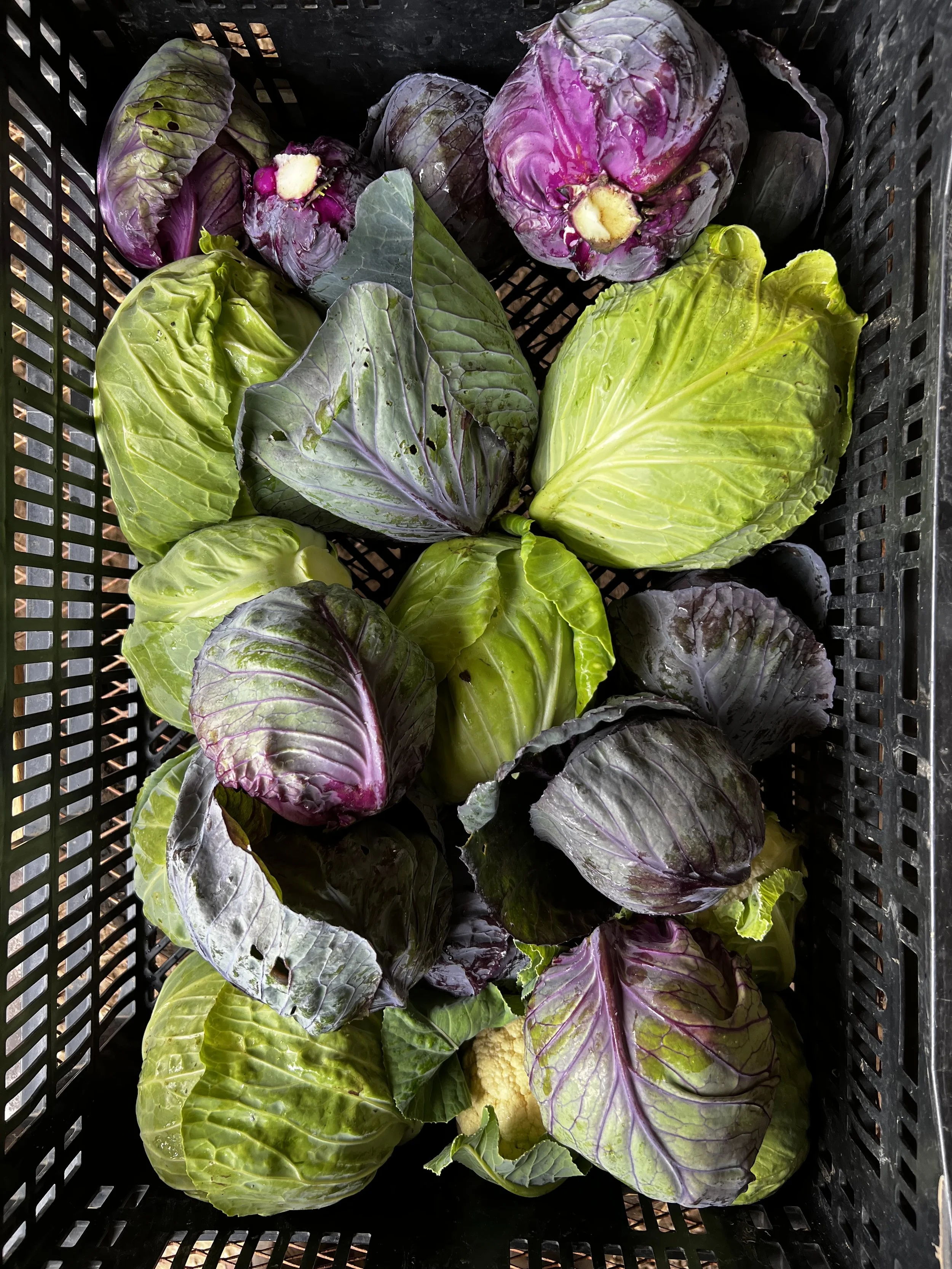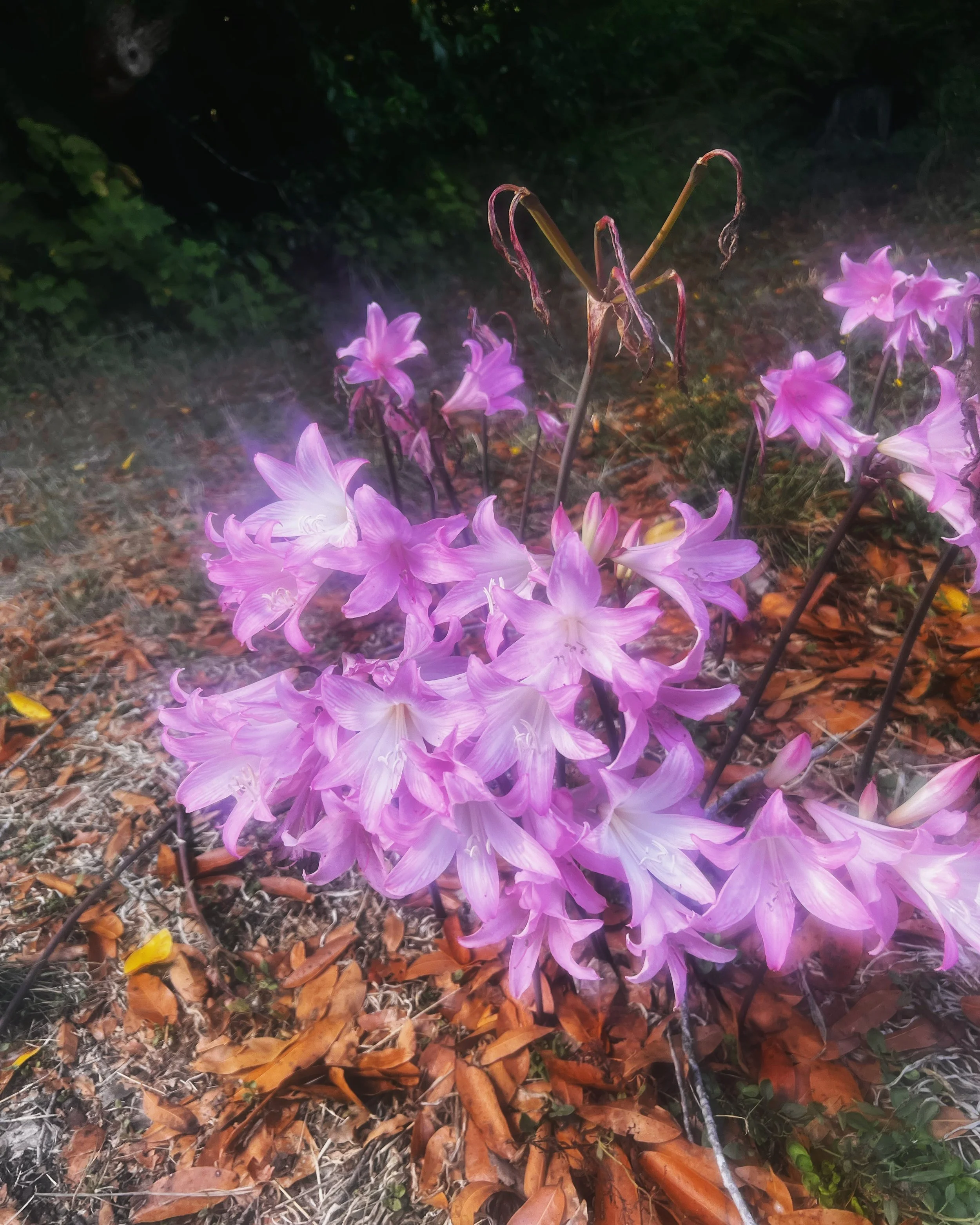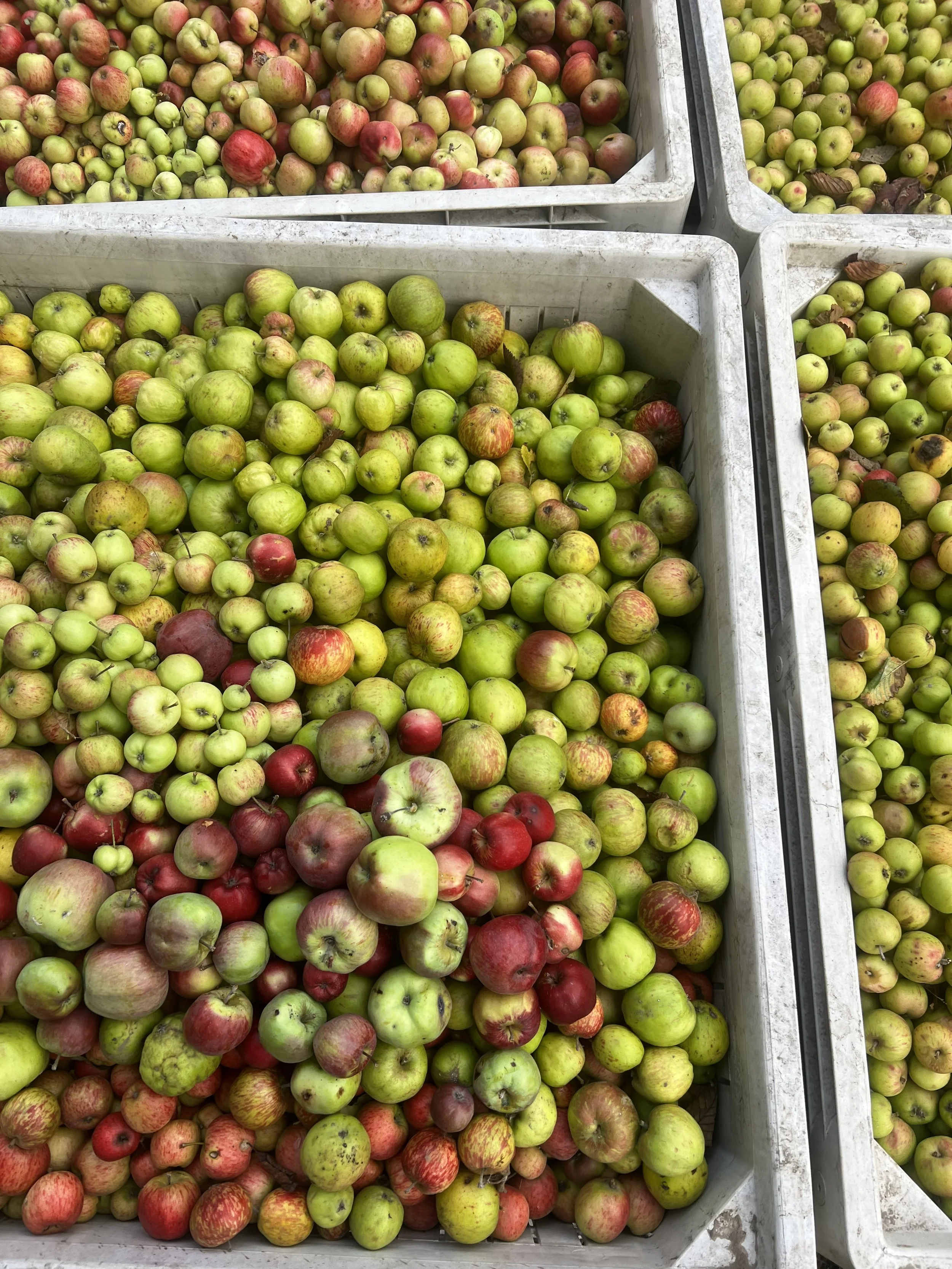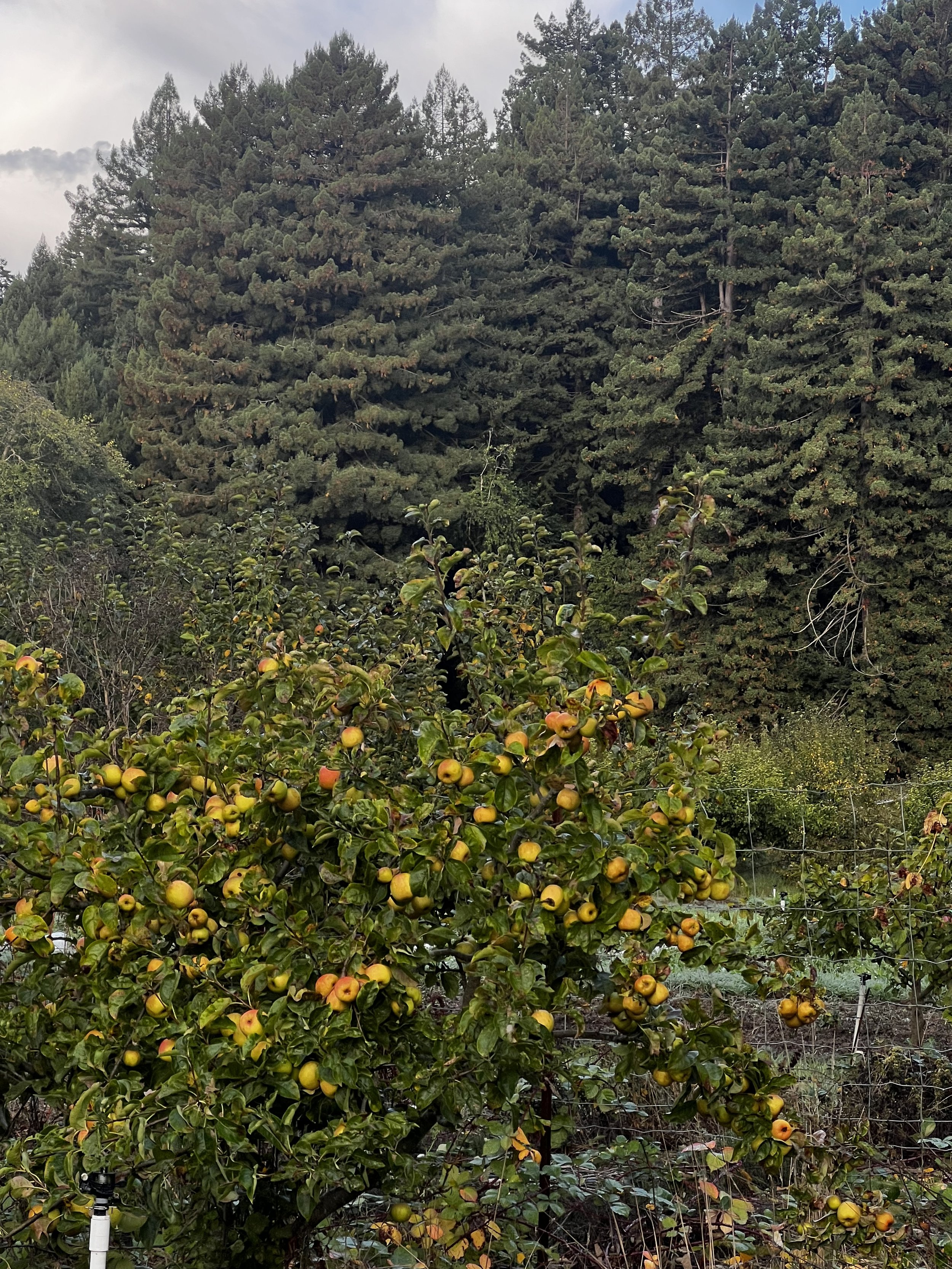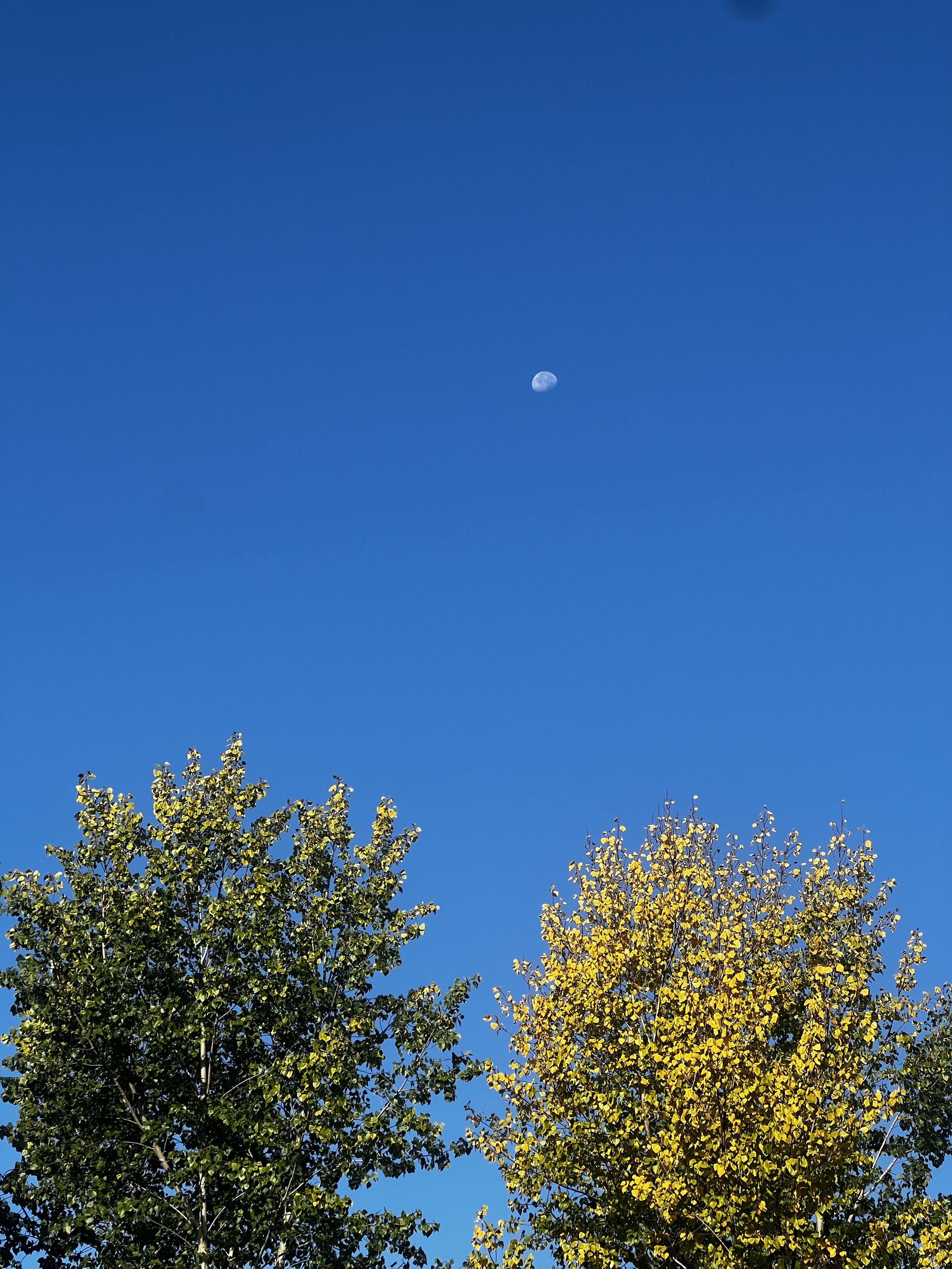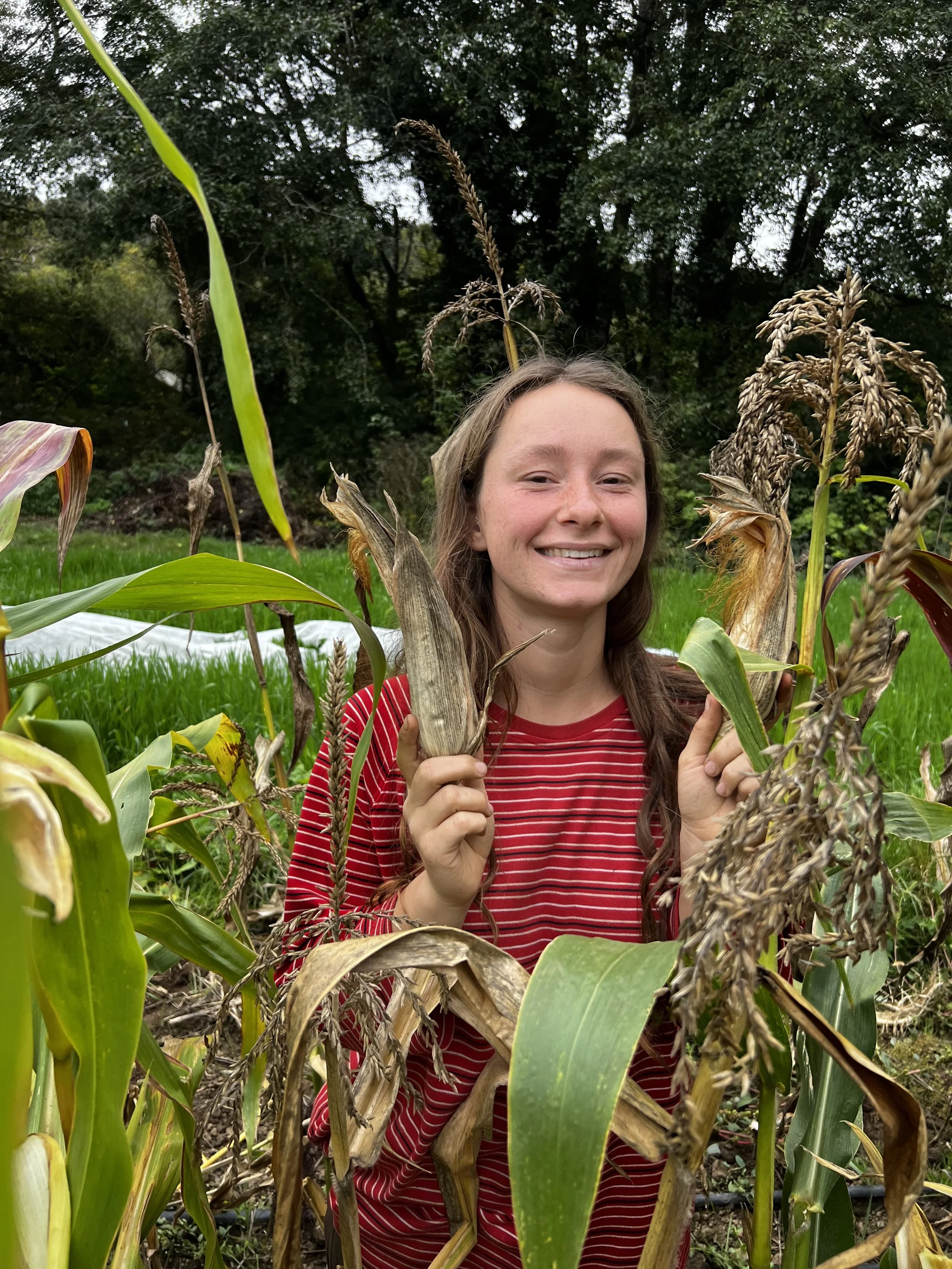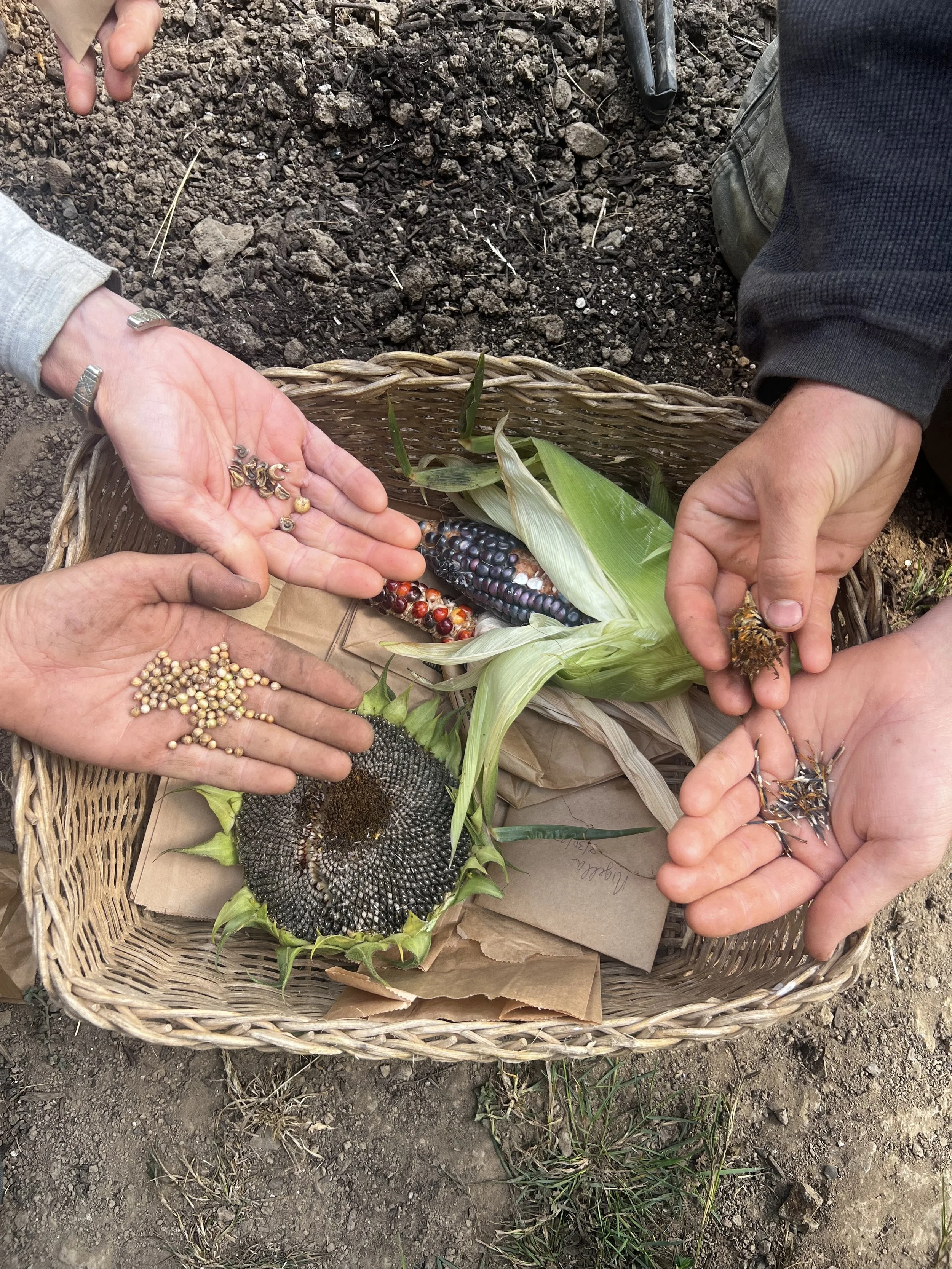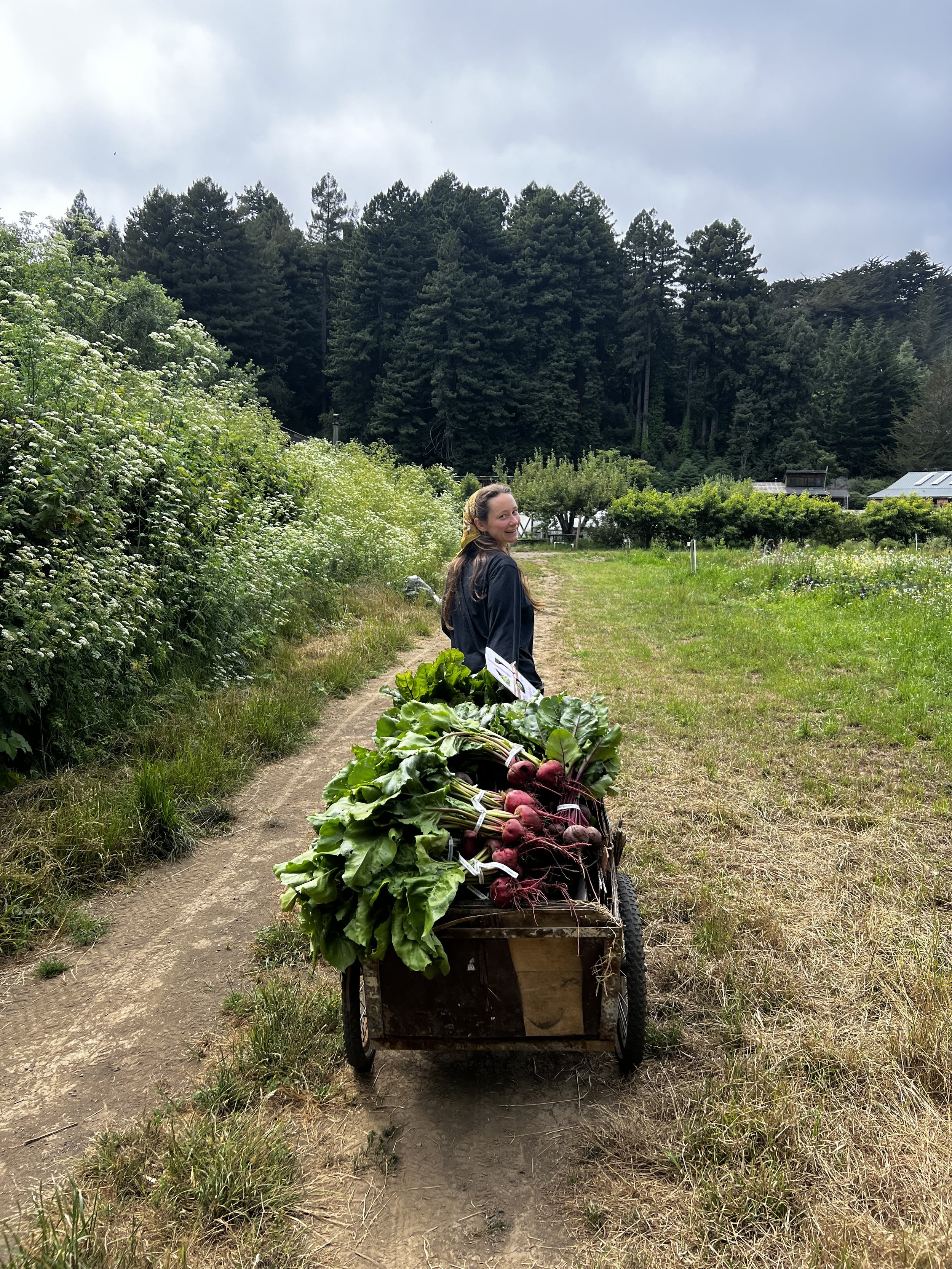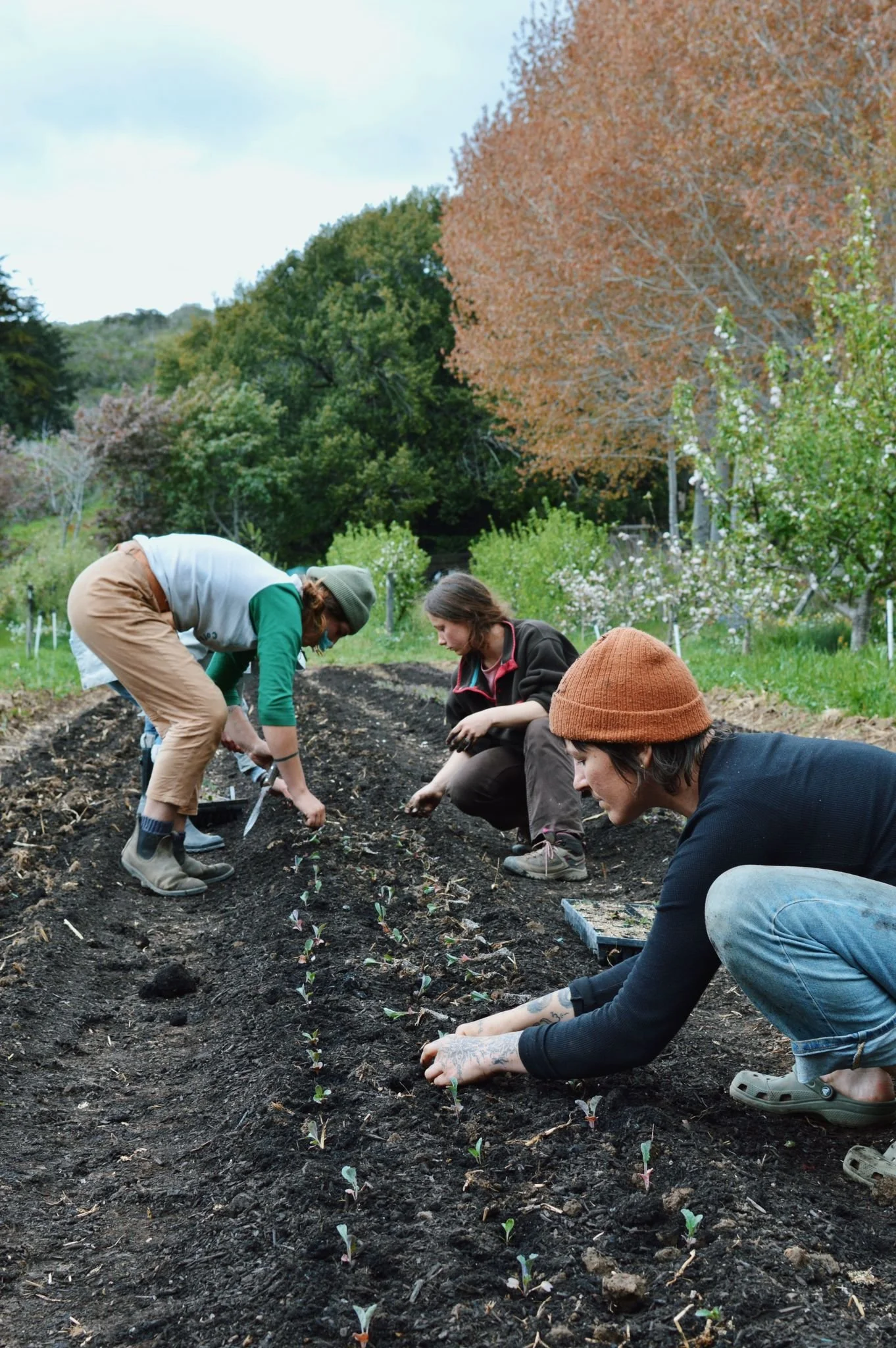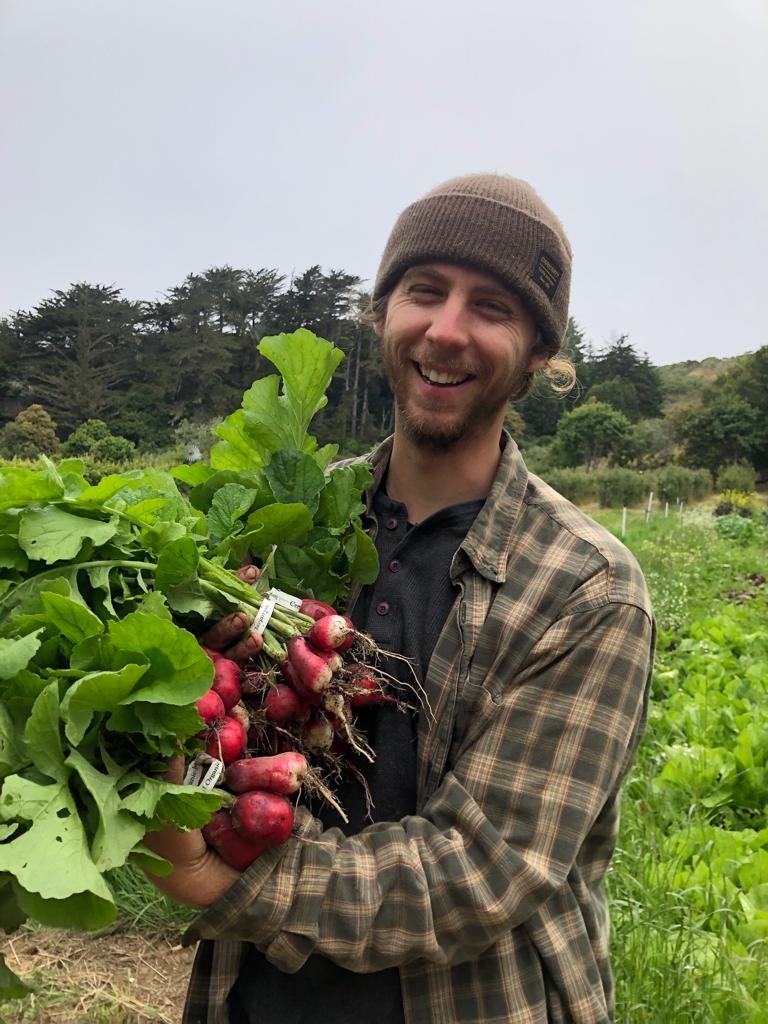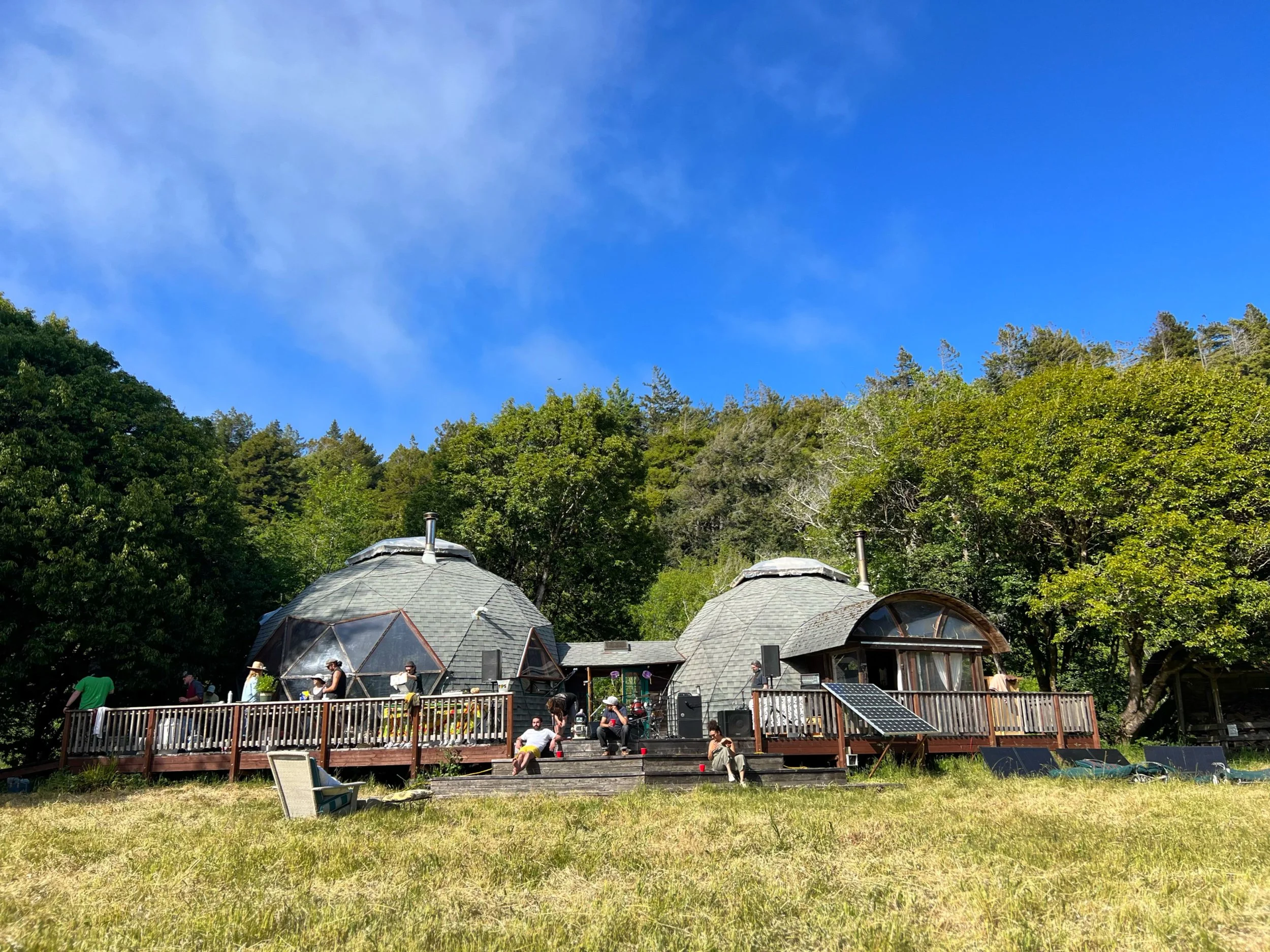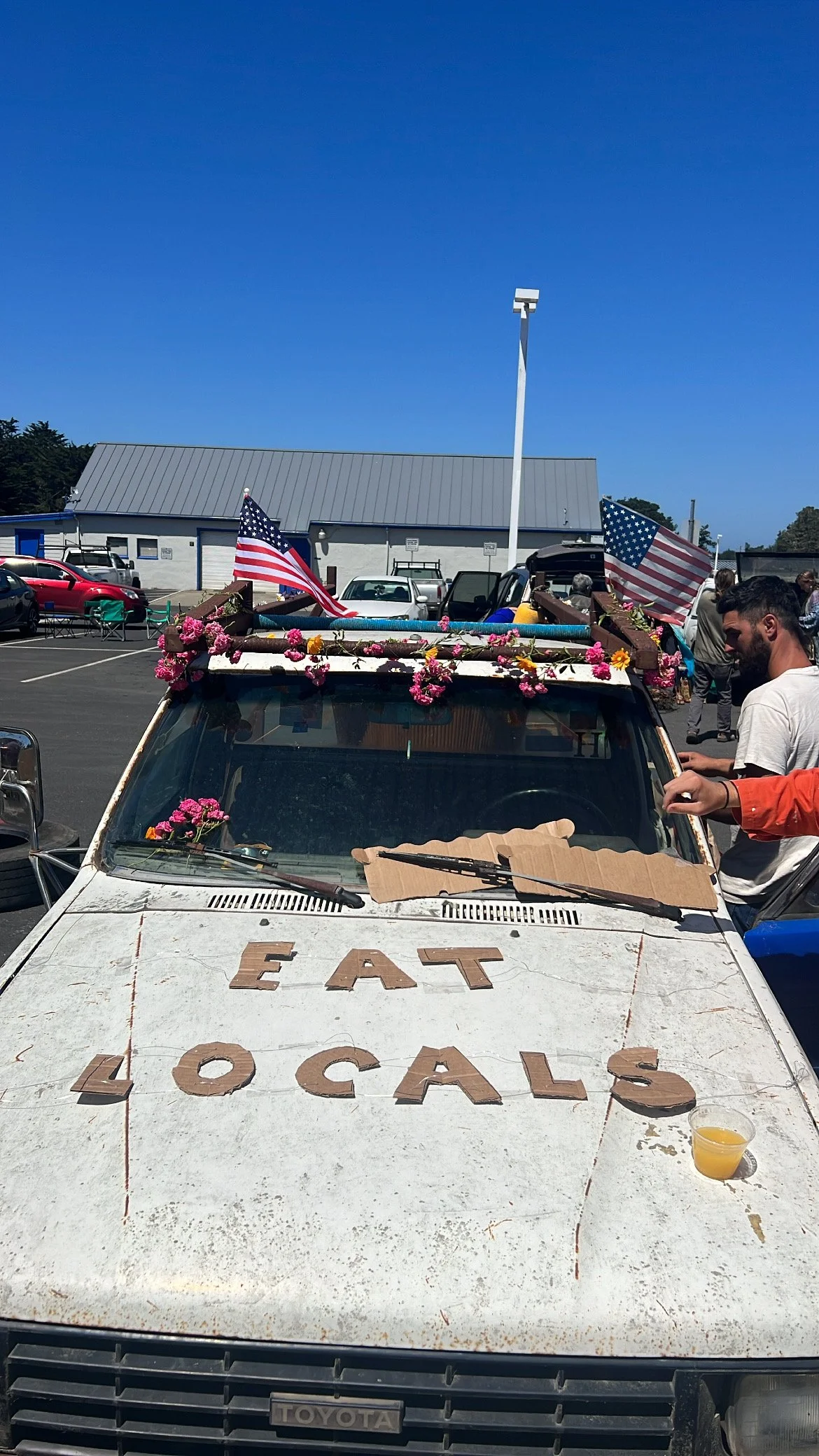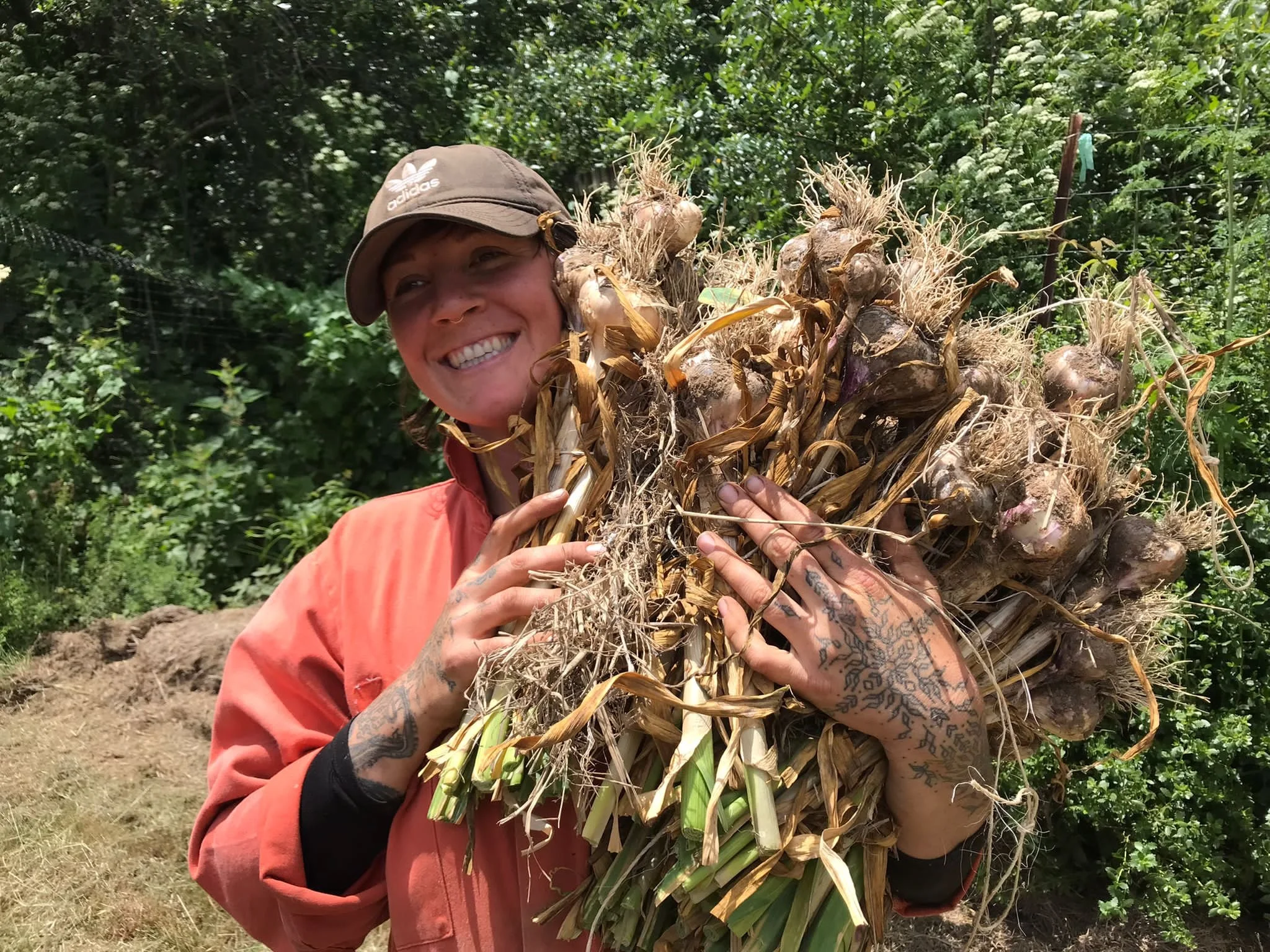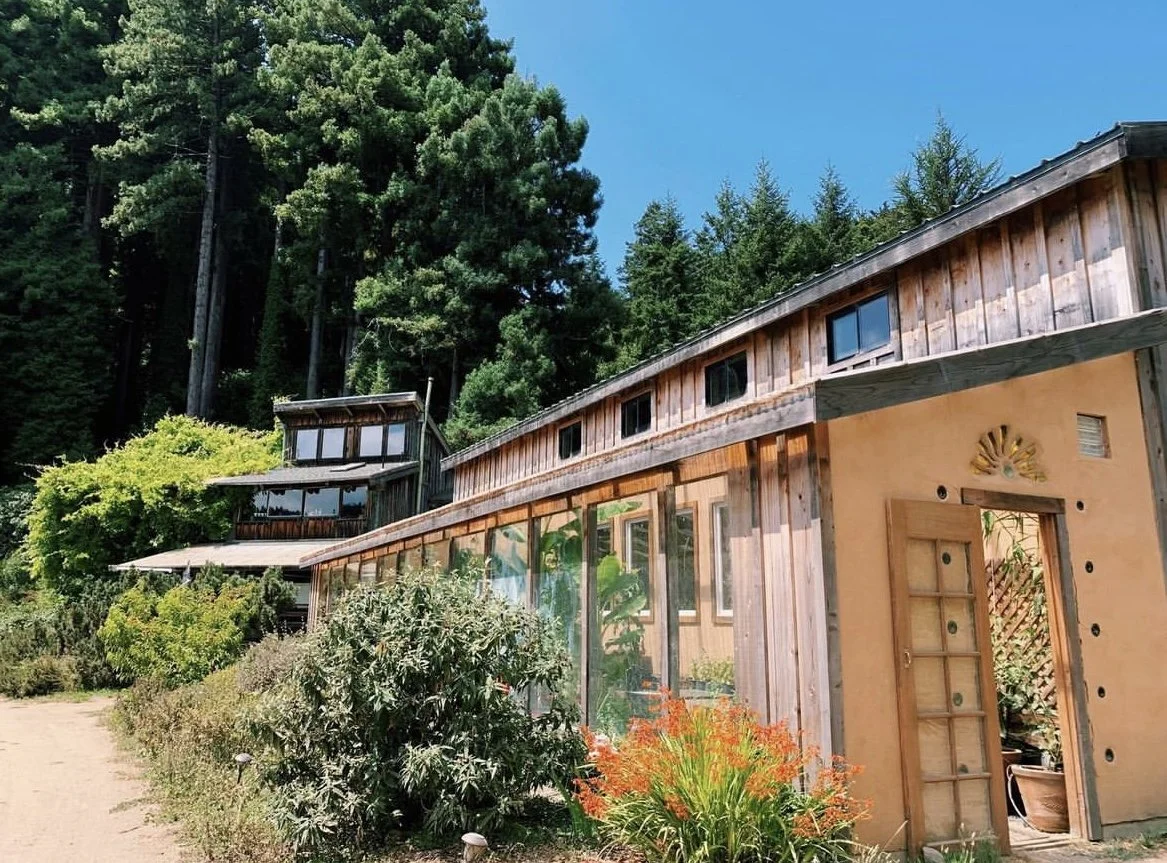Hello everyone!
It would seem that the changing of the seasons is upon us, bringing us to the doorstep of the end of the growing season (and our CSA box deliveries, unfortunately). Here at Oz, that means a few different things. It means lots of time spent out in the orchard harvesting untold numbers of apples as they ripen, it means preparing the crop beds for their rest over winter, and for the apprentices it’s a time of reflection as we come upon the end of our apprenticeship.
At the beginning of the season (and our learning curves), we learned to “wake up” the fields from their winter slumber, using a broadfork to aerate the soil, adding any nutrients that may be lacking, and installing irrigation lines that would keep our new crops thriving. After a season of rest, we worked hard to realize the potential in the grounds we lived and worked on. This was by no means an easy task, and more than a little nerve wracking at times. There were certainly days that our work felt like climbing a mountain of marbles.
Over time though, sprouts began to appear and we began to grow alongside them. Harvest mornings (which had started as a hectic 6 hour rush) started to fall into a rhythm as we got used to the workflow and the amazing crops in our care. I realize now that all this time we were working the Earth, Mother Earth was working us right back. Over the course of the season, I’ve felt myself being reborn into a stronger version of myself. One that is no longer so daunted by the seemingly never ending challenges of being in true communion with the land.
And now, coming to the close of the season, there are still more lessons yet to be learned. Now we will be learning to “put the beds to bed”, and prepare the fields for their season of rest. We’ve been harvesting and pulling up beans, corn, and squash crops, taking out and storing irrigation lines, and pulling silage tarps over whole plots like giant quilts. Tucking the land in for bed.
Enjoy the abundance.
Heidi, Farm Apprentice
Chrozicle Issue #636
Autumn blessings from Oz!
We are fully immersed in the season and, in turn, fully indulging in the greatest display of abundance all year! The air is cooling, as the earth and out spirits begin to relax and recenter as we begin to enter the winter season.
I also want to acknowledge and thank the farmers, apprentices, other managers, coordinators, all the beloved members of our families and the greater community who joined us in our annual Harvest Celebration! We are truly honored to be surrounded by such amazing, dynamic, and generous people! Can't wait to share the fruits of our labor over the holiday season and look forward to the celebration next year!
All my love and gratitude,
Eric Schneider
Maintenance Manager
Chrozicle Issue #635
Here at the farm the apples are ripening with sweetness in the crisp, cool fall air, we’re noticing the days quickly becoming shorter, and feeling grateful for the first rains rejuvenating the land.
Now that autumn has arrived, it’s time for us to join a great tradition stretching far back to our ancestors, a tradition shared by many peoples and cultures throughout the ages. We call it the Harvest Festival. In these days of abundance (and looking ahead to the low light and chill of winter), we give thanks for the nourishment of the land, the fertility of the soil, the labors of the hands that have worked it, and the ties of community. The tradition of similar celebrations seems to date back nearly as far as agriculture itself– many variations of festivals of harvest were practiced in ancient times, from Egypt to China, throughout Africa and Europe, across Mesoamerica and South America, and today countless others continue in every corner of the world. Many have coincided with the full moon of the month at the peak or end of the harvest season, many have included Goddess worship and celebration of fertility. As long as humans have cultivated land and crop we’ve gathered to share and express our gratitude for the Earth and the blessings of sun and water– celebrating the many gifts we’ve received through feasting, parade, song, prayer, dance and any other imaginable human revelry.
In doing so we honor and participate in the great cycles to which we owe our very lives. We acknowledge that which must lie down in the grave of winter in order for the bounty to rise again in springtime, we give thanks for the endless renewal of life. We honor the life that has been given and taken over the course of the season to nourish our own lives, we give thanks for the perfect transformation of things. We attend to the paths of the Sun and Moon, we give thanks for the light, and for the darkness.
Please join us at Oz Farm this Saturday, October 7, 2pm - 8pm, to celebrate the bounty of the season, the labors of our apprentices, and the beautiful tapestry of community through food. We’ll have food featuring Oz veggies, cider from our orchard, apple pies, live music, farm tours, and loads of fun.
https://digitalgallery.bgsu.edu/exhibits/show/thanksgiving-culture/harvestfestivals
https://www.britannica.com/list/5-harvest-festivals-around-the-world
Best,
Jordan Gardner, Farm Manager
Chrozicle Issue #634
Happy Tuesday,
Another week is here and passing on the farm; and as I sit here this Monday evening and think of what to write, all I can think about is how tumultuous the days can be here, in every way. Each day is a flurry of all kinds of activity, from work, to cooking, after-work projects, socializing; there’s never a dull moment (unless we are thinning beets or carrots or something). Today, instead of farming, I helped dig a trench to find a big leak in our irrigation system. Last week I chased a deer through a bunch of stinging nettle to corral it out of our main field. A couple of us are making some “home-brew” with apple and pear juice we made from the leftover fruit we didn’t sell. I don’t think my life has ever been so engaging.
Growing food for people can be hard, and all of the challenges we face to get the food from seed to CSA box are well worth it to see it all packed up. Every crop on the list this week—every week, really—has had its challenges. With the gems getting munched by deer, beetles eating holes in the kale, onions bolting, worms in everything, cabbage (along with everything else) annihilated by gophers, you learn to stay on your toes, and take the experience with you to do it a little differently down the road.
I’m grateful for the opportunity to learn so many different things and feed so many people, including myself and my friends around me. As the season winds down, we hope you savor every last bit of the harvest and preserve whatever’s left, to enjoy sometime in the winter! We certainly are.
Thanks for reading,
Jacob, Farm Apprentice
Chrozicle Issue #633
Hi there folks!
You’ve heard a lot about the joys of life on Oz Farm through vague descriptions of sunsets and redwood forests and friends around the table. However, I’m going to flip the switch to shine a light on the dark side, behind-the-scenes problems and mistakes that take up a lot of our energy every day and can keep me up at night. I think it’s important to share the realtime challenges with you as you have signed up for the ride with us and unknowingly experience the impact of each success and failure in the fields through the contents of your box each week. This is the really juicy and sweet part of the CSA model, where we make this agreement together to roll through the highs and lows together. You’ve lent your trust and upfront financial support and we’ve given our best effort to grow wholesome, diversified, beautiful food for you. As new farm managers we came in kind of blind, and have been feeling our way slowly in the darkness over the course of this season. Right up close each challenge can seem catastrophic, but with a little perspective looking back on the season it appears more like a comedy of errors. I hope you’re laughing with us.
First, early in the season before apprentices arrived, we spent a month trying to gopher/rat/bird-proof the greenhouse tables as mysterious night prowlers took out thousands of plant starts under the cover of darkness. It was devastating to see the continuous loss, morning after morning, which hit us hard especially in terms of flowers and early produce.
Then it flooded, water logging the fields and making for a very late start - so we couldn’t plant all those eaten starts anyhow! We optimistically thought the flood might lower the gopher population (which it may have done short-term) but woooodoggy they’re back with a vengeance!! They have recently destroyed about 50% of mid-summer plantings of lettuce and brassicas, which is cutting into our autumn supply of greens and broccoli. What the gophers are not pulling underground to eat (they suck whole plants down into their tunnels), the deer are browsing from overhead! They love to chomp the tops off of fennel, dig into every lettuce heart they come across, and even browse those bitter chicories that you’re probably thankful to the deer for eating so no more giant escarole goes into the csa boxes ;).
We built temporary hoop houses in the spring for the tomatoes, peppers, and eggplant. Two out of three have survived the coastal wind, but our poor peppers and eggplant are exposed and not producing without the greenhouse effect. We miss you friends!
Our summer plantings of brassicas- meaning kales, chard, broccoli, cauliflower, etc - have been impacted by an explosive overpopulation of flea beetles this season, which nibble lacy holes in the leaves, stunting the plants’ growth. As a certified organic farm we do not use insecticides, and are limited in our response, which has mainly been to spray regularly with a mixture of soap and neem oil. We are hopeful that the population will decline over the winter and we can implement more proactive strategy next season, using cloth or net covering to protect the plants from insect damage.
One of the greatest and latest challenges that we’ve been facing has to do with water - first noticing how quickly we were running out and the related crop stress. As you can imagine, the underground water infrastructure and plumbing at Oz is somewhat mysterious, having been cobbled together over the decades by many different people with varying skill sets and visions (kind of like everything here). For the past couple of months, water has been seeping out of the system to the extent that we have had almost no ability to store the water pumped out of a well when the light is on the solar panels during the day. During this last week, some of the crew have been digging in search of the broken pipe, 24” under a hard-packed road. Due to continuous weddings and retreats on the property, we are unable to use large machinery to dig up the line and locate the leak. We are still deep in the problem-solving on this one, running all the irrigation we can during daylight hours on the annual crops and trusting the deep root systems of the perennial trees to survive the summer without irrigation.
These are just a few of the countless facets of mystery and mistake that we have encountered over the past months that have shaped the contents of your csa boxes. Some weeks it’s on the lighter side when available crops are limited, and some weeks the box is heavy with abundance. We try to balance it out with confidence that we have your full support in our effort to grow the soil, grow community, and grow good food to feed your life energy. Thank you for your trust and understanding in bearing with us through the ebbs and flows of the season. May we remember that every challenge is an invitation to learn, grow, and respond with grace and stability in the current of ever-changing conditions.
Katy, Farm Manager
Chrozicle Issue #632
As the fall Equinox approaches we begin our transition into the tail end of the season. August is usually considered “burnout month” on the farm but this year with the late rains we had everything on the farm is a little behind schedule. The apples are a few weeks late, tomatoes are finally ripening, we’re just beginning to see color on our peppers. We are always playing nature’s game and as much as we try to impose our will on the farm, nature reminds us who is in charge. We never know what nature will bring next so we try to be like a horseback rider. “In the saddle, as long as you have good posture and a good seat, you can overcome any startling or unexpected moves your horse makes. So the idea of the saddle is having a good seat in your life.” Farming on land is a lifelong education and every year brings new lessons. Sometimes we fall off the horse completely but ideally we learn to anticipate the things that used to blindside us and take action before small problems become big problems. With so much going on at the farm this time of year it can feel like we’re constantly chasing down problem after problem without making forward progress but as long as we stay mindful in “the saddle” we’ll make it through any surprise nature throws our way.
Although it can feel like there’s so much more to do it always is encouraging to reflect back on how much we have done already and remember that we are making progress, together, day by day, at nature’s speed, to our goals of a successful season.
Thanks for your support!
Dean
Chrozicle Issue #631
Happy September! ( can you believe it?! )
As the farmers are farming, the apples are appleing and the season be seasoning!
September is one of my favorite months, it feels like the top of a deep breath before the exhale. Summers peak energy is still vibrating through the soil while the crisp morning air reminds us to cherish the tomatoes that continue to ripen.
As we fold ourselves into Virgo season, and our focus shifts to little details of our lives, we continue to invest our energy into the realistic potential with attentive work and dedication.
On the farm, that looks like time and energy spent harvesting pears and apples that were planted long before us, tending to tomatoes ready for canning, thinning radishes and plucking parsley.
For myself, this seasonal energy has manifested in forms of communication. Connecting with my new community, having conversations of what was and what is to come.
A special thank you to everyone who supports us each week, and an extra appreciation to all that came out to the farm this past Friday for our pizza night fundraiser, the turn out was a great reminder of how loved and supported we are within our community.
With massive gratitude,
Roza
Retreat Manager
Chrozicle Issue #630
The oldest cultivated beings on the farm are apple trees. When we arrived as apprentices in April they were flowering with beautiful white blossoms; the bees buzzing around them, birds swooping above. The first tiny fruits were joyously noticed, but still the long-lived stalwarts that we walked amongst every day were less often greeted and noticed than the more rapidly growing, flourishing lettuces and greens, zucchini and potatoes, broccoli and tomatoes that we have learned to sow, carefully tend, and harvest through months of farming in this amazing environment.
Now the apples are starting to ripen and are ready for harvest. The trees that we were so excited to learn about now inspire a deep reverence as we begin to more carefully work with them to understand their growth and needs, varieties and flavors of fruit. We prune them and it feels relieving; harvest and sample and we feel enlivened, joyful; learn about their history and pruning techniques from the wider Oz community and feel once again part of a long-lived, vital, connected community with intricately-shaped (sometimes knobbly and gnarled) beings at the core.
We are so glad to share the first bounty from these trees with you and have you join in the crisp, sweet appreciation of this new season’s harvest. And we hope that you will all come to greet and thank the trees themselves at this year’s Harvest Celebration in October. We can’t wait for the pies and a full day dedicated to sharing enthusiasm for these thriving beings with the entire community connected to them.
Laura - Oz Apprentice
Chrozicle Issue #629
Tomatoes, basil, and buckets of squash,
herbs bundled and drying for tea in the fall,
the time of abundance and preservation at once.
Breaking bread and saving seeds,
a full table of neighbors sharing their tales,
exchanging stories and contributing with busy hands.
The days are long,
long enough for river plunges at their end,
this season won't last and the fog and smoke are a reminder of that.
Enjoying the now and wondering about the future,
everywhere else has disaster on their hands,
ours are busy working.
-Amanda Mahaffey, Nonprofit + Apprenticeship Manager
Chrozicle Issue #628
It is early morning and the birds who inhabit the willows that now, in the height of summer, envelop my little cabin, are beginning to chirp and sing. For the last hour I’ve watched the sky brighten, waking up — or trying to — to the creakiness of my body, the multitude of thoughts and feelings of this morning.
Now, midway through the growing season and my time here at Oz, I feel like I am farming, living in this community; securely enmeshed in the workings of this place, and it is as challenging for me as it is beautiful. Newness is challenging, and so much of my work and daily life here is new to me! I am realizing and accepting, though, that the interconnectedness of this community of people to each other, to the broader ecosystem of the farm and wilder lands surrounding it, consists of a balance of challenges — of navigating relationships, continually putting forth physical and emotional effort — and of ease — of friendship, abundance of harvest, and joy of learning.
I've been trying to really savor my time here, especially the sweet, enjoyable experiences/moments/tasks. Most of these pop up on your average day at Oz, during the workday as well as not, which is so special. I want to share a few with you:
Digging potatoes. Smooth and round treasure right beneath the soil surface. Nails chock full of dirt.
The farm kitchen front porch. A congregation spot. Any number of projects filling up the space, people sitting, standing and leaning, talking. Stopping by or hanging for hours. It shakes when the washer’s running.
Cooking and eating all the beautiful veggies we grow as well as meat and dairy and mushrooms and berries grown by our wonderful friends and farmer’s market community. It’s a huge privilege and joy to have access to this food, and to prepare it with so many people who grow it and care for it together.
I’m super excited for the remainder of this season, and I hope you are too! Thanks so much for the support and all the love,
Helen, Apprentice
Chrozicle Issue #627
This year really seems to be flying by, so let’s take the time to gather our loved ones around a table full of good food and take these beautiful moments exactly as they are.
At our dinner table on the farm, mealtimes with the whole crew are accentuated with rawness. We have moments of hardship, relief, laughter, and humanity even on days filled with frustration and stress. We have overcome increasingly strange weather patterns, flea beetles, and a never ending war on weeds. And yet, at the end of the day we come together over the food we’ve grown with love for each other, the work that we do, and an earth that loves us right back.
On the hardest days, all of us come to dinner with raw hands and hearts. But one look around the table reminds me why we are all here. The team that runs this farm is not the one any of us would have imagined. A group of people so incredibly different, yet impossibly similar. Not unlike the world we live in…
In fact, maybe we (as human beings on this wondrous planet) aren’t so dissimilar at all. All of us come from our own hardships and battles. All of us seek a life that makes our battles worth it. And all of us wonder about a world where we can all come together, maybe over a plate of good food.
In my time at Oz, I’ve come to believe it’s not only possible but incredibly beautiful to see in action. The road may be long and it’s certainly going to take a village, so thank you for being an important part of ours.
Heidi Lundberg, Apprentice
Chrozicle Issue #626
VII
Put your hands into the mire.
they will learn the kinship
of the shaped and the unshapen,
the living and the dead.
VIII
When I rise up
let me rise up joyful
like a bird.
When I call
let me fall without regret
like a leaf.
IX
Sowing the seed,
my hand is one with the light.
Hoeing the crop,
my hands are one with the rain.
Having cared for the plants,
my mind is one with the air.
Hungry and trusting
my mind is one with the earth.
Eating the fruit,
my body is one with the earth.
– Wendell Berry, from “Prayers and Sayings of the Mad Farmer”
As we continue to turn the fields this season we continue to turn the wheel of life and death: each new seeding brings the miraculous emergence of the living from the inevitability of the dying. As farmers we are blessed to practice this truth with our own hands.
Recently our apprentices joined a long human tradition and tried their hands at direct seeding, a technique of planting seeds into the ground we do with our trusty little Earthway seeder, pushing spinach, cilantro, dill, radish, turnip, beet, and carrot seeds into prepared earth. A seed is a true miracle, proof of magic we may easily overlook: the form of each vegetable (let alone a tree) emerges from so tiny a package… sort of like the big bang.
For millennia we have planted seeds–by stick, by clay seed ball, by hand, sprinkling this magic across the earth and participating in the great unfolding dance of life. Many peoples have sang over the sowing, or prayed, imbuing the seeds with the highest vibrations of reverence, gratitude, and prosperity. Such foods are surely medicine!
These days on the farm we are busy harvesting and harvesting: a bounty of freshly dug potatoes, plumping bulbs and fronds of fennel, the tomatoes beginning to ripen on the vines. As we harvest the gifts of the earth we join again the circle in death, honoring the life that has been given and will live again in you, in me, in each of us as we eat the fruit of the earth. And again we turn the field, turning our lives, and, in glimpses, understanding better our place in the great brocade.
Jordan Gardner, Farm Manager
Chrozicle Issue #625
"...I watch the world shimmer inside this globe of a summer night,
listen to the wobble of her spin and dive. It happens all the time, waiting for you to come home..."
Joy Harjo
"Summer Night"
Summer is the time when the seeds we sow, both literal and figurative, truly begin to display the full effects of the efforts and energy we have cultivated since winter and early spring. In the case of Oz, the fruits of our most earnest efforts have been so bountiful! This is a time to really step back, soak in the power of the sun and indulge in the rewards of all the love and hard work that runs through ourselves, sun and water to the soil, and finally to the wonderful produce that comes full circle back to us.
The staff and apprentices in our amazing community of Oz Farm have put so much into this process, and we thank you as our extended community for being a part of it in your support of our efforts and helping make such a wonderful summer crop possible. Now, we are reinvigorated to continue our work and keep our eyes and hearts open to the growing excitement of the coming harvest season, as well as seasons to follow!
With love and appreciation for all you,
Eric Schneider
Maintenance Manager
Rosa, Helen, and Amanda sinking their hands into the soil on a planting morning.
Chrozicle Issue #624
Thank you once again for supporting Oz Farm through our CSA program; you are the bread and butter of what we do here on the farm and we are so joyed every week to provide you all with what we got. This week’s box is a bit experimental, with a curveball or two to spice up your favorite meals. More on that in a sec…
First, a bit of an update. The theme of the week here at Oz is really change and transition. One of our head farmers, Jordan, is back from a trip and we are stoked, refreshed and optimistic. Some fields are getting mowed and prepped for new rounds of veggies, winter crops are on our minds and in the plans, different goodies are cycling through our tables at the markets (with tomatoes not far behind). The sun’s coming out more, people are getting married, and we gazed in awe at a pink, purple and green sky behind a double rainbow the other night. Basically, it’s never not exciting or beautiful here.
In the boxes this week, keep an eye out for the purslane and the sugarloaf chicory. The purslane is a nutrient-dense sort of succulent-looking thing that grows here at Oz that we eat all the time, either as a snack by itself, added to a salad, or made into a salad on its own (it’s a bit like lemongrass).
The sugarloaf chicory is a bitter green which means it’s almost unbearable to me (I have a sweet tooth), even though it’s called sugarloaf. The trick is going to be using it as a sort of wrap or braising it up with other good veggies. If you wanna get creative, try using it in the pasta recipe that I’ll include below.
Also in the box this week is a bouquet of holy basil, or tulsi basil. This basil has been known for its health benefits that can be found online, or if you sit with it for a while it might just let you know. Throw it in a vase or a big cup with some water (don’t put it in the fridge!) to preserve, and to have the room smelling heavenly.
Thanks again for all the love and support! We always love seeing everybody at the markets and in town.
Till next week,
Jacob, Apprentice
Our Apprentice Jacob showing off some radishes! He’s become quite the root veggie reader this season.
Chrozicle Issue #623
Dear members and supporters of Oz,
As farmers, we are in fact not so much “growers” of food as caretakers of the soil. The soil is not static, uniform dirt, but rather an ecosystem thriving with life - bacteria, fungi, algae, worms, nematodes etc. Plants, including the food we grow here at Oz, are just one node of this larger web that depends on everything else.
For the last hundred years, fossil-fuel based tractor work has dominated the relationship between farmers and soil (conventional and organic), most foundationally in the realm of tillage. Tillage is essentially the preparation for planting through mechanical mixing of the soil that leaves a bare surface to plant into. The mechanics, the speed and the convenience are powerful and necessary in some sense to feed an ever-growing human population. The power and ease of it can also be blinding to larger consequences.
We are now taking a closer look at those repercussions – disturbance and destruction of the soil ecosystem large and small, dependence on fossil fuels, the release of carbon from the soil, compaction, erosion and nutrient runoff, and endless growth of “weeds” that are just trying to cover the soil back up in its natural aliveness. Our human ideas are habitual and shortsighted in the belief that we can dominate the land and find a better way to work than the systems evolved over two thousand million years.
I, too, have been trained over the last decade in the “conventional” organic methods of growing food. I have run a tractor over many fields, watching an entire ecosystem taken out in a matter of minutes through the disturbance of soil with a powerful machine. I, too, am grappling with how do I examine my conditioned understanding of farming methods, unlearning and relearning with a wider understanding and attentiveness to soil, plant, and ecosystem health? It’s easiest to go with the flow, go with what we know, but the renegade spirit here at Oz has inspired a turn onto the path of no-till, a hot and controversial subject right now in the agricultural community.
At Oz this season we are beginning to practice no-till agriculture, a system in which we try to leave the soil undisturbed as much as possible while continuing to feed and care for it. We cover fields with silage tarps to occultate, allowing the crop residue to break down underneath while simultaneously germinating “weeds” that die back without light, creating a bare planting surface with less long-term weed pressure. The apprentices run a broad-fork through the soil before planting to aerate and open without pulverizing the natural structure (and they get a good workout!). We are playing with cause and effect, keeping our senses open, paying close attention to everything, and making lots of mistakes along the way! There are no instant results in farming, and not a whole lot of results to report on yet; we are at the beginning of a new chapter and our invitation is trust, to witness the unfolding over many seasons.
This land holds a rich history of friends and farmers that endeavor to breach the norms and together create a path to explore and sustain our connection to the land and greater community. Through no-till agriculture we are striving to understand how to harmonize with the natural systems that nourish the growth of soil, plants, and people. Thank you for your support of these endeavors in myriad shapes and forms. Please take a moment to appreciate the soil this week as you roast up the roots!
Katy
Oz Farm Manager
The Domes in the summer sun.
Chrozicle Issue #622
Today is the Fourth of July, Americas Independence Day. Since breaking ties with the monarchy we’ve pressure tested democracy and became a thriving nation. What if some of the independence we celebrate can have unanticipated consequences? The little boxes we live in and the nuclear families that inhabit them can turn a palace into a prison if we independently drive our cars into our garages.lock up our doors and close our blinds. I love my independence more than anything but the reality is that we are all interdependent on each other as neighbors on this earth.
Depression and anxiety can grow out of control if our independence is out of balance with our interdependence. Isolation was a picture painted by our culture as connected to affluence and the success of our nation. In other cultures around the world interdependence is the root to people’s well-being. Research shows that people with high levels of social support seem to be more resilient in the face of stressful situations. They also have a lower perception of stress in general and have less of a physiological response to life's stressors.
Thinking of the Fourth of July celebrations this last weekend, it was a celebration of community coming together, not independently but interdependently. It’s my growing edge right now to reverse learn my culturally ingrained habits of independence and ask for help when I need it, lean on my community and make connections with the people that feed my spirit.
Here’s a couple quotes I'm pondering right now:
“If you want to go fast, go alone. If you want to go far, go together. ” - African Proverb
“Interdependence is and ought to be as much the ideal of man as self-sufficiency. Man is a social being.” -Mahatma Gandhi
“The fundamental law of human beings is interdependence. A person is a person through other persons.” -Desmond Tutu
- Dean
Our Fourth of July float, lovingly driven by our friend Dylan, reminding everyone to Eat Local (but don’t eat the locals!)
Chrozicle Issue #621
Nestled between the redwoods and the apple trees; I write to you as one of the many new faces here at Oz.
It seems we’ve collectively adopted this space to care for from some amazing land stewards before us, whose energy is interwoven throughout our little container.
As we live and work together, we’ve become a part of a team, that’s truly blossoming into a family.
During the day our key focus is tending to the land, seeing what she needs from us in order to continue to provide. In return we’ve been not only nurtured and provided for by the wealth of food growing out of the ground, but guided into community.
Every evening we gather around the table, sharing more than just food. Slowly cracking our hearts open and sharing our stories of who we each are and what journeys we’ve had to land us in these seats sitting across from each other.
As the seeds we’ve planted continue to grow into little energetic forms of nutrition, and we continue to share our stories and recipes, I’d like to thank those before us.
Including most (if not all) of you, who have loved and supported Oz farm way before I showed up.
Thank you,
Roza
P.s. try making hash browns out of turnips instead of potatoes.
It will not disappoint.
Rosa with the garlic harvest. Did you know each clove is a garlic seed?
Chrozicle Issue # 620
The farm is full of so many new faces. With two new Farm Managers, five new apprentices, one new Maintenance Manager, and myself - the Nonprofit and Apprenticeship Manager- this brand new team has been spending our days getting to know the land, community, and each other. We can't wait to meet you all too and get to know you as neighbors and friends who we are growing this special food for.
Our sweet team has been spending our days working with intention- we plant seeds with reverence and hope, we learn about the biology of soil and what it needs to thrive, we notice the plants' response to irrigation, climate, and row cover, working to create the right conditions for the farm. We have been getting to know companion plants, building high tunnels for our heat-loving summer crops, chasing after gophers and watching in awe at the herons who have come to the farm to help. We spend our days reminding the farm dogs to "Stay out of the field!", checking in on each other and learning together the best way to do our tasks - from big plant-out days to exciting harvest days. We sing lots of songs (on the good days!), do lots of yoga (all the days!), eat together every evening, and most importantly, grow delicious, nutritious food.
The gift of being land stewards is not lost on any of us. I wake up every morning to the sounds of birds and wind through the trees, watch the fog roll out while the tea kettle warms, take a long and beautiful walk to the farm fields, and check in on all of our new and old plantings along the way. In a world where so few have the opportunity to witness such startling daily beauty, I try not to take this special land for granted. Our mission at Oz is to get more folks deeply into the fold. How can we educate and mentor the next generation of farmers and land tenders? How can we grow intensively with high quality on small plots of land so the rest can be preserved as forest and habitat around us? How can we welcome little ones to the farm to learn how to be seed keepers and soil healers? How can we help bring the counter culture to the tables and homes of those who need it? How can we grow Oz into an impactful and fruitful education center for all?
I'm pretty excited to steward these big visions. We couldn't do it without you!
Hope to connect with you all,
All the best and most farm fresh,
Amanda Mahaffey, Apprenticeship and Nonprofit Manager
The sunny, straw-cob solarium. Earthen materials, for the win!
Chrozicle Issue #605
“In this food,
I see clearly the presence
of the the entire universe
supporting my existence”
A meal verse by Thich Nhat Hanh
The current heat wave that’s baking the Pacific Northwest has got a lot of us thinking about global weirding and our impact on Mother Earth. It seems as if some of our degenerate habits could be creating unhealthy consequences for our communal home.
“Nothing is enough for the man to whom enough is too little.”
-Epicurus
Wastefulness is a deplorable habit us humans have which has negative consequences on a planet with finite resources. People in parts of the world are starving while hoarding of wealth creates artificial food shortages wasting food.
Wasteful people can be akin to someone who shakes the Apple tree so all the fruit drops to the ground both ripe and unripe. This wasteful Apple eater collects only what he wants and leaves the rest to rot. This metaphor can be transposed over many criminal activities conducted by man in his attempt to satiate his thirst for wealth and power.
I’m very excited about Oz Farm's transition into the not-for-profit space. I like to think of Village Oz (the 501c3 we formed last year) like a bee collecting pollen from a flower. This bee neither harms the flower or its fragrance but gathers the pollen to make sweet honey. We should expect people to make legitimate use of nature and hold ourselves accountable for our own footprints on this pale blue dot, the only world known so far to harbor life.
As Gary Snyder says “the test of the pudding is in the eating!” There is strong ethic behind the food we grow at Oz and your support helps us continue to turn flowers into honey and seeds into food!
With patience,
Dean
This year's apprentices are growing their own plots to share food with local families in need. The plots are thriving and Caroline is excited to share her first harvest of beautiful radishes!
Chrozicle Issue #604
"An Ode to Compost"
I am the crust of the earth
I am the worm in the dirt
I have become stricken
With decomposition
-Cody
Farmer Tristan gets ready to put hundreds of baby plants in the ground
